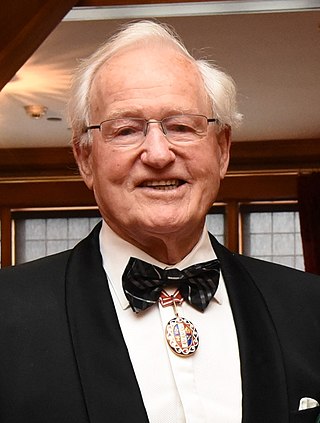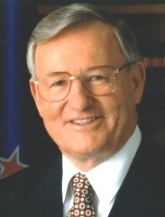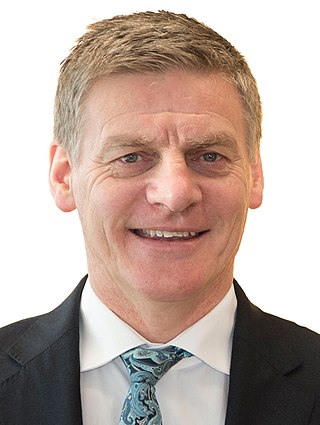
The politics of New Zealand function within a framework of an independent unitary parliamentary representative democracy. The system of government is based on the Westminster system, and the legal system is modelled on the common law of England. New Zealand is a constitutional monarchy in which King Charles III is the sovereign and head of state, while his prime minister serves as the head of government.
Rogernomics were the neoliberal economic reforms promoted by Roger Douglas, the Minister of Finance between 1984 and 1988 in the Fourth Labour Government of New Zealand. Rogernomics featured market-led restructuring and deregulation and the control of inflation through tight monetary policy, accompanied by a floating exchange-rate and reductions in the fiscal deficit.
The New Zealand Labour Party, also known simply as Labour, is a centre-left political party in New Zealand. The party's platform programme describes its founding principle as democratic socialism, while observers describe Labour as social-democratic and pragmatic in practice. The party participates in the international Progressive Alliance. It is one of two major political parties in New Zealand, alongside its traditional rival, the National Party.
The New Zealand National Party, shortened to National or the Nats, is a centre-right New Zealand political party, currently leading a coalition government. It is one of two major parties that dominate contemporary New Zealand politics, alongside its traditional rival, the Labour Party.

Electoral reform in New Zealand has been a political issue in the past as major changes have been made to both parliamentary and local government electoral systems.

Sir Michael John Cullen was a New Zealand politician. He served as the 16th deputy prime minister of New Zealand, also as the minister of Finance, minister of Tertiary Education, and attorney-general. He was the deputy leader of the Labour Party from 1996 until November 2008, when he resigned following a defeat in the general election. He resigned from Parliament in April 2009, to become the deputy chairman of New Zealand Post from 1 November 2009 and chairman from 1 November 2010 until leaving the role in 2016. On 6 March 2020 he announced that he had resigned from the Lakes and Bay of Plenty district health boards, respectively. At the same time he also announced that he had been diagnosed with stage 4 small-cell lung cancer, which had also spread to his liver.

Ruthanasia, a portmanteau of "Ruth" and "euthanasia", is the pejorative name given to the period of free-market policies conducted during the first term of the fourth National government in New Zealand, from 1990 to 1993. As the first period of reform from 1984 to 1990 was known as Rogernomics after the Labour Party Minister of Finance, Roger Douglas, so the second period became known as "Ruthanasia", after the National Party's Minister of Finance, Ruth Richardson.

James Brendan Bolger is a New Zealand retired politician of the National Party who was the 35th prime minister of New Zealand, serving from 1990 to 1997.

Ruth Margaret Richardson is a retired New Zealand politician of the National Party who served as Minister of Finance from 1990 to 1993. Her 1991 budget, which she dubbed the "Mother of all Budgets", formed the catalyst for her party's economic reforms known in the media as "Ruthanasia".

The 1993 New Zealand general election was held on 6 November 1993 to determine the composition of the 44th New Zealand Parliament. Voters elected 99 members to the House of Representatives, up from 97 members at the 1990 election. The election was held concurrently with an electoral reform referendum to replace the first-past-the-post system, with all members elected from single-member electorates, with mixed-member proportional representation. It saw the governing National Party, led by Jim Bolger, win a second term in office, despite a major swing away from National in both seats and votes, and the carrying of the referendum by 53.9% to 46.1%.

The 44th New Zealand Parliament was a term of the Parliament of New Zealand. Its composition was determined by the 1993 elections, and it sat until the 1996 elections.

Paula Lee Bennett is a New Zealand former politician who served as the 18th deputy prime minister of New Zealand between December 2016 and October 2017. She served as the deputy leader of the National Party from 2016 to 2020 and as MP for Upper Harbour from 2014 to 2020.
Gilbert Colin Myles is a former New Zealand politician who entered Parliament for the National Party in 1990, then split from the party in 1991 and sat as an independent, before representing the Liberal Party, the Alliance and the New Zealand First party.
The Fourth Labour Government of New Zealand governed New Zealand from 26 July 1984 to 2 November 1990. It was the first Labour government to win a second consecutive term since the First Labour Government of 1935 to 1949. The policy agenda of the Fourth Labour Government differed significantly from that of previous Labour governments: it enacted major social reforms and economic reforms.
The Fourth National Government of New Zealand was the government of New Zealand from 2 November 1990 to 27 November 1999. Following electoral reforms in the 1996 election, Jim Bolger formed a coalition with New Zealand First. Following Bolger's resignation, the government was led by Jenny Shipley, the country's first female Prime Minister, for the final two years.

The Fifth Labour Government of New Zealand was the government of New Zealand from 10 December 1999 to 19 November 2008. Labour Party leader Helen Clark negotiated a coalition with Jim Anderton, leader of the Alliance Party. While undertaking a number of substantial reforms, it was not particularly radical compared to previous Labour governments.
The 2011 New Zealand voting system referendum was a referendum on whether to keep the existing mixed member proportional (MMP) voting system, or to change to another voting system, for electing Members of Parliament to New Zealand's House of Representatives. It was held on 26 November 2011 in conjunction with the 2011 general election.

The 2017 New Zealand general election took place on Saturday 23 September 2017 to determine the membership of the 52nd New Zealand Parliament. The previous parliament was elected on 20 September 2014 and was officially dissolved on 22 August 2017. Voters elected 120 members to the House of Representatives under New Zealand's mixed-member proportional (MMP) voting system, a proportional representation system in which 71 members were elected from single-member electorates and 49 members were elected from closed party lists. Around 3.57 million people were registered to vote in the election, with 2.63 million (79.8%) turning out. Advance voting proved popular, with 1.24 million votes cast before election day, more than the previous two elections combined.

Political funding in New Zealand deals with political donations, public funding and other forms of funding received by politician or political party in New Zealand to pay for an election campaign. Only quite recently has political funding become an issue of public policy. Now there is direct and indirect funding by public money as well as a skeleton regulation of income, expenditure and transparency.

The 2023 New Zealand mini-budget, also known as Mini Budget 2023, was released by Minister of Finance Nicola Willis on 20 December 2023 as part of the Sixth National Government's plan to address the cost of living, deliver income tax relief, and reduce the tax burden. The Government's mini-budget delivered NZ$7.47 in operational savings by repealing or stopping 15 programmes launched by the previous Labour Government including 20 hours of free child care for two-year olds, eliminating depreciation for commercial buildings and dissolving the Climate Emergency Response Fund.











